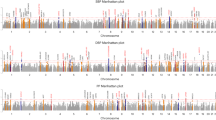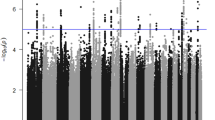Abstract
Essential hypertension is a principal cardiovascular risk factor whose origin remains unknown. Classical genetic studies have shown that blood pressure is at least partially heritable, opening a window to understanding the pathophysiology of essential hypertension in the human using modern genetic tools. The Wellcome Trust Case Control Consortium has recently published the results of screening the genomes of 2000 essential hypertension cases and 3000 controls using 500 000 genome-wide single nucleotide polymorphisms (SNPs). None of the variants proved to be genome-wide significant after correction for multiple tests but the most significantly associated SNPs (P<10−5) constitute a priority list that warrant follow-up in other studies. We describe here replication studies of the top six SNPs in subjects from the US National Heart, Lung, and Blood Institute funded Family Blood Pressure Program comprising 11 433 individuals recruited by hypertensive families. The results suggest that only one of the six SNPs might be associated with essential hypertension in Americans of European origin. This SNP shows a significant but opposite effect in Americans of Hispanic origin and no association in African Americans. The significance of the opposing effect estimates is unclear. No replication could be shown for hypertension status, but there are differences in study design. This attempted replication highlights that essential hypertension studies will require more comprehensive and larger genetic screens.
Similar content being viewed by others
Log in or create a free account to read this content
Gain free access to this article, as well as selected content from this journal and more on nature.com
or
References
Oldham PD, Pickering G, Roberts JA, Sowry GS : The nature of essential hypertension. Lancet 1960; 1: 1085–1093.
Rosamond W, Flegal K, Friday G et al. Heart Disease and Stroke Statistics — 2007 Update. Circulation 2007; 115: e69–e171.
Ezzati M, Lopez AD, Rodgers A, Vander Hoorn S, Murray CJ : Selected major risk factors and global and regional burden of disease. Lancet 2002; 360: 1347–1360.
Lifton RP, Gharavi AG, Geller DS : Molecular mechanisms of human hypertension. Cell 2001; 104: 545–556.
FBPP: Multi-center genetic study of hypertension: the Family Blood Pressure Program (FBPP). Hypertension 2002; 39: 3–9.
WTCCC: Genome-wide association study of 14 000 cases of seven common diseases and 3000 shared controls. Nature 2007; 447: 661–678.
Tobin MD, Sheehan NA, Scurrah KJ, Burton PR : Adjusting for treatment effects in studies of quantitative traits: antihypertensive therapy and systolic blood pressure. Stat Med 2005; 24: 2911–2935.
Purcell S, Cherny SS, Sham PC : Genetic power calculator: design of linkage and association genetic mapping studies of complex traits. Bioinformatics 2003; 19: 149–150.
Wigginton JE, Abecasis GR : PEDSTATS: descriptive statistics, graphics and quality assessment for gene mapping data. Bioinformatics 2005; 21: 3445–3447.
Chen WM, Abecasis GR : Family-based association tests for genomewide association scans. Am J Hum Genet 2007; 81: 913–926.
Li M, Boehnke M, Abecasis GR : Joint modeling of linkage and association: identifying SNPs responsible for a linkage signal. Am J Hum Genet 2005; 76: 934–949.
Lange C, DeMeo D, Silverman EK, Weiss ST, Laird NM : PBAT: tools for family-based association studies. Am J Hum Genet 2004; 74: 367–369.
Abecasis GR, Cardon LR, Cookson WO : A general test of association for quantitative traits in nuclear families. Am J Hum Genet 2000; 66: 279–292.
Gudmundsson J, Sulem P, Manolescu A et al: Genome-wide association study identifies a second prostate cancer susceptibility variant at 8q24. Nat Genet 2007; 39: 631–637.
Acknowledgements
We thank all volunteers that have participated in the FBPP studies and the NHLBI for funding. FBPP Web site: http://www.biostat.wustl.edu/fbpp/FBPP.shtml. We also thank Serena Sanna, Cagliari, Italy, for help with Merlin and Lamp and to Richard Olshen, Stanford, USA, for statistical advice.
Author information
Authors and Affiliations
Corresponding author
Additional information
Conflict of interest/Disclosures
None.
Supplementary Information accompanies the paper on European Journal of Human Genetics website (http://www.nature.com/ejhg)
Supplementary information
Rights and permissions
About this article
Cite this article
Ehret, G., Morrison, A., O'Connor, A. et al. Replication of the Wellcome Trust genome-wide association study of essential hypertension: the Family Blood Pressure Program. Eur J Hum Genet 16, 1507–1511 (2008). https://doi.org/10.1038/ejhg.2008.102
Received:
Revised:
Accepted:
Published:
Issue date:
DOI: https://doi.org/10.1038/ejhg.2008.102
Keywords
This article is cited by
-
Integrated statistical and pathway approach to next-generation sequencing analysis: a family-based study of hypertension
BMC Proceedings (2014)
-
Non-replication study of a genome-wide association study for hypertension and blood pressure in African Americans
BMC Medical Genetics (2012)
-
Genetic variations in ATP2B1, CSK, ARSG and CSMD1 loci are related to blood pressure and/or hypertension in two Korean cohorts
Journal of Human Hypertension (2010)
-
A genome-wide association study identifies new loci for ACE activity: potential implications for response to ACE inhibitor
The Pharmacogenomics Journal (2010)
-
Polymorphisms in the Tropomyosin TPM1 Short Isoform Promoter Alter Gene Expression and Are Associated With Increased Risk of Metabolic Syndrome
American Journal of Hypertension (2010)



